Premium Only Content
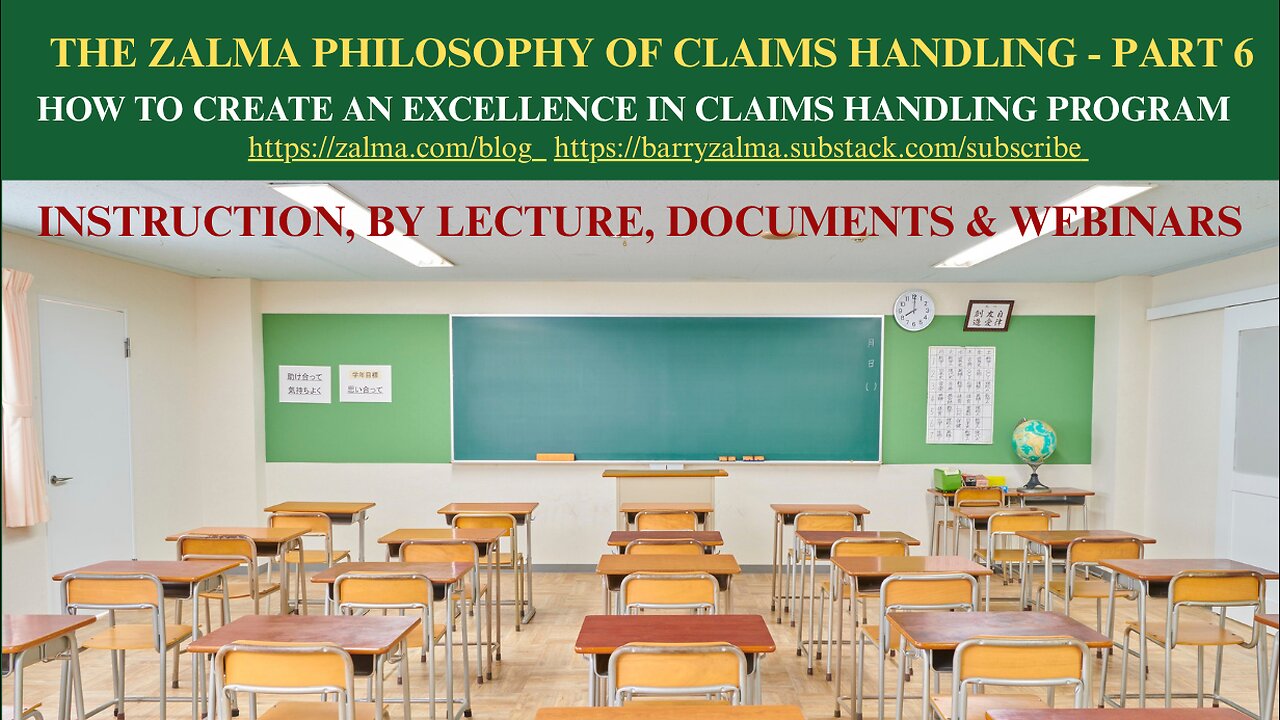
The Zalma Philosophy of Claims Handling - Part 6
HOW TO CREATE AN EXCELLENCE IN CLAIMS HANDLING PROGRAM
Post 5217
This is a change from my normal blog postings. It is my attempt. in more than one post, to explain the need for professional claims representatives who comply with the basic custom and practice of the insurance industry.
An Excellence in Claims Handling program begins with a statement in the insurer’s claims manual or statement of professionalism that it is dedicated to providing excellence in claims handling to every insured who presents a claim.
The excellence in claims handling program should include, at a minimum:
A series of lectures supported by text materials explaining:
A definition of insurance.
How to read and understand an insurance policy.
How to interview an insured, witness, or claimant.
How to assist an insured in the insured’s obligation to prove a claim.
How to repair or replace damaged real or personal property.
How to repair or replace damaged vehicles.
How to identify causes of loss.
How to recognize the red flags of fraud.
The duty of the claims person who suspects attempted fraud.
How to negotiate with an insured, claimant, public adjuster or lawyer to resolve a claim.
How to recognize when retaining counsel to represent the insurer is necessary.
How to retain counsel to represent the insured.
How to read and understand the contract that is the basis of every adjustment, including but not limited to the formation of the insurance policy and the rules of contract interpretation.
Tort Law: Including Negligence, Strict Liability in Tort, and Intentional Torts.
Contract law including:
the insurance contract,
the commercial or residential lease agreement,
the bill of lading, nonwaiver agreements,
proofs of loss,
releases of claims,
non-waiver agreements,
other claims related contracts or documents,
The duties and obligations of the insured in a personal injury claim,
The duties and obligations of the insurer in a personal injury claim,
The duties and obligations of the insured in a first party property claim,
The duties and obligations of the insurer in a first party property claim, and
The Fair Claims Practices Act and the Regulations that enforce it.
The Thorough Investigation, Including:
Basic investigation of an auto accident claim.
Investigation of a construction defect claim.
Investigation of a first party property claim.
The Red Flags of Fraud.
The SIU and the obligation of the claims representative when fraud is suspected.
Claims Report Writing.
The evaluation and settlement of the personal injury claim.
Evaluation and investigation of a Marine or Inland Marine claims.
Evaluation and investigation of the property claim for fire, lightning, windstorm, hail, theft or burglary.
How to retain coverage counsel to aid when a coverage issue is detected.
How to control coverage counsel to limit counsel to the opinions needed.
Instruction, by Lecture, Documents & Webinars
Dealing with a plaintiff’s lawyer.
Dealing with personal injury defense counsel.
The evaluation and settlement of the property damage claim.
The Appraisal process.
Arbitration and mediation and the claims representative.
Any other topics particular to the insurer.
Claims handling without excellence is both dangerous and expensive. Insurers must develop a professional claims staff and provide excellence in claims handling because by doing so they will profit more than if they keep an inadequate and unprofessional claims staff.
The training lectures must be supplemented by meetings between knowledgeable and experienced supervisors and claims staff on a regular basis to reinforce the information learned in the lectures.
To guarantee that the training and requirement for excellence in claims handling is effective the insurer must also institute a regular program of auditing claims files to establish compliance with the requirement to deal fairly and in good faith to the insured.
The insurer’s management must support the training and repeat it regularly because people have short term memory loss and need to reinforce what they have learned and what is required of them when dealing with an insurance claim. The professional claims handler never sees the identical claim every time. Claims, factual background, and the people involved are invariably different and the professional claims handler must be capable of adapting to the people and facts involved.
The insurer’s management must, therefore, be committed to audit claims files to determine whether the training has taken and is being applied to each claim. It is imperative that claims management determines whether there is a need to refresh the memory of the claims personnel and add new information and claims processes.
There is no quick and easy solution. Excellence in claims handling training takes time; learning takes longer and must be repeated and modified to changed situations and new and modified appellate decisions changing the interpretation of a policy wording.
If the insurer does not have personnel with the ability to train its staff it should use outside vendors who can do so effectively. Many such sources are available from colleges, universities, professional associations, independent claims adjuster firms, independent counsel, insurance related publications, insurance related podcasts, and continuing education providers.
Part Seven of The Zalma Philosophy of Claims Handling will deal with the creation of an Excellence in Claims Handling Program.
(c) 2025 Barry Zalma & ClaimSchool, Inc.
Please tell your friends and colleagues about this blog and the videos and let them subscribe to the blog and the videos.
Subscribe to my substack at https://barryzalma.substack.com/subscribe
Go to X @bzalma; Go to Barry Zalma videos at Rumble.com at https://rumble.com/account/content?type=all; Go to Barry Zalma on YouTube- https://www.youtube.com/channel/UCysiZklEtxZsSF9DfC0Expg; Go to the InsuranceClaims Library – https://lnkd.in/gwEYk.
-
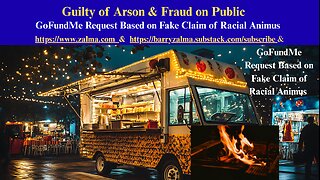 7:10
7:10
Insurance Law
26 days agoGuilty of Arson & Fraud on Public
1661 -
 1:01:27
1:01:27
VapinGamers
16 hours agoTools of the Trade - EP09 The One About Comedy with Lou Perez - !rumbot !music
15.5K1 -
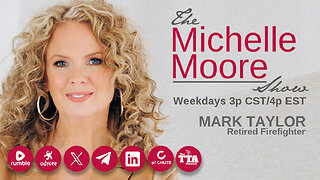 2:10:06
2:10:06
The Michelle Moore Show
1 day ago'Capitol Tunnels, DC Doctored Crimes Scandal, Jesus In History Books, Pinktober Darkside & more' Guest, Lt. Mark Taylor: The Michelle Moore Show (Oct 27, 2025)
20.3K89 -
 LIVE
LIVE
Lofi Girl
2 years agoSynthwave Radio 🌌 - beats to chill/game to
193 watching -
 3:05:31
3:05:31
Price of Reason
11 hours agoTrump DHS Shakeup? Sydney Sweeney Christy Movie EARLY Review! Disney JUMP Ship After Doctor Who FAIL
179K6 -
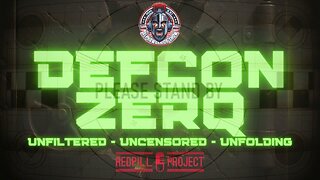 2:44:01
2:44:01
Badlands Media
10 hours agoDEFCON ZERQ Ep. 015: The Hidden Hand, UFOs, and the Global Awakening
132K64 -
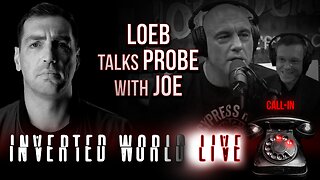 2:03:09
2:03:09
Inverted World Live
10 hours agoLoeb Talks Probe with Joe | Ep. 131
75.8K8 -
 3:06:01
3:06:01
TimcastIRL
8 hours agoGOP Declares Biden Pardons VOID Over Autopen, DOJ Announces Investigation | Timcast IRL
245K188 -
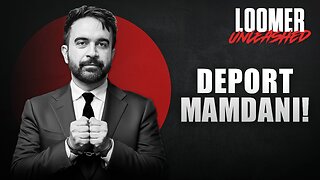 2:51:22
2:51:22
Laura Loomer
7 hours agoEP153: DEPORT MAMDANI!
49.7K49 -
 1:03:39
1:03:39
Flyover Conservatives
1 day agoAre ‘Aliens’ Really Demons? The Coming Digital ID System - Dr. Stella Immanuel; Frequencies of Control - Leigh Dundas | FOC Show
47.8K7